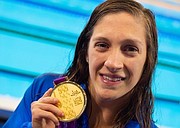Alyssa Gialamas first started swimming when she was just three years old. At the time, it was a form of physical therapy for the now 24-year-old Arlington resident, who was born with arthrogryposis – multiple contracted joints – in her legs and hands. Still, it wouldn’t be until years after her first dip in a pool that she’d even have a glimpse of her future as a world-class athlete and a member of Team USA.
Gialamas is a gold medal winning member of Team USA, for that matter. She is fresh off winning gold and silver medals – in 50-meter backstroke and 200-meter freestyle swimming events, respectively – at the 2019 Parapan American Games, a multi-summer sport competition among athletes from the countries throughout North and South America. This year’s Games took place in Lima, Peru, between Aug. 23 and Sept. 1.
“My body works better in the water than it does outside the water,” Gialamas said. “I’ve always kind of taken to the pool. I grew up swimming able-bodied, and it just never occurred to me that I was that good. Then, when I was 13, I went to an adaptive sports organization, and they were the ones who told me I was good, and that kickstarted the training to get me where I am today. I kept going to bigger and bigger meets, and then I started at national level and international level 2011.”
While the Pan American Games is for able-bodied sportsmen and women, the Parapan American Games is for athletes with disabilities. These Games happen every four years in tandem with the Pan American Games. They occur every year before the Paralympic and Olympic games.
Paraswimming is extremely competitive.
“Arthrogryposis definitely impacts my daily life,” Gialamas said. “I walk with long leg braces, which I’ve had since I was a baby. But you adapt and learn to overcome. You just find ways to do certain things, and maybe I view my disability differently because I’ve had it since I was a baby. I can do anything I want to do; I just have to learn a little differently.”
Her disability hasn’t stopped Gialamas from competing time and time again on a world stage. She’s been a member of Team USA for nearly a decade, having competed in the Paralympic Games in London in 2012, and then in Rio de Janeiro in 2016. There have also been World Championships in between.
“There are tryouts every year for the Paralympics and Olympics, which run parallel to each other” Gialamas explained. “You have to hit certain times for the national team. You have to qualify every three months and meet this national standard, keeping a certain world rank.”
It takes far more than raw talent to earn (and to keep on earning) a position on Team USA.
“I train six days a week,” Gialamas, who moved from her native Chicago to Baltimore, Maryland in 2014 to attend Loyola University, said. “Prior to starting my full-time job with Cigna this year, I was doing two-a-days. I was a Division I swimmer for Loyola, where we’d swim every day from six to eight in the morning, and then come back Mondays and Wednesdays for afternoon swims. The other three afternoons were for dryland strength training.”
She graduated from Loyola in 2018 with her bachelor’s degree in Communications.
“I am a very stubborn and determined individual, and I like proving people wrong,” she said. “When people underestimate me, I love breaking down that barrier. Finishing school has been one of my greatest accomplishments, and it was a big barrier. It was also a balance with competitive swimming, and now I’m so fortunate to work for such a great company who supports me for all of that. I was able to work out of their Baltimore office twice a week to train for the Parapan Am Games with my college team. It has been really great, and it’s always about doing what you need to do to make something work.”
Even though she’s added more responsibilities and a whole host of other goals to her plate since she first earned a spot on Team USA, she’s not slowing down. In fact, her Parapan Am times were some of the fastest she’s had in her career.
“I’m really proud of how I did at the Parapan Am games this year,” she said. “To go into this big life change, with a full-time job and no longer having swimming as my priority, and to still be able to swim as fast as I did – that’s a lot for anyone. Then at the Games... I haven’t swam those times in ten years. To be able to handle it all and juggle it all, I’m really happy. I take a lot of pride in being an elite athlete with a physical disability.”
